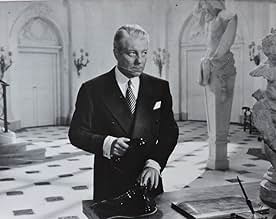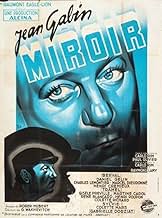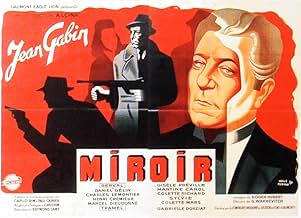Agrega una trama en tu idiomaPortrait of a two-faced man. By day he is rich, brilliant and respectable financial officer Lussac; at night, he becomes "Mirror", a ruthless gang leader in Marseilles.Portrait of a two-faced man. By day he is rich, brilliant and respectable financial officer Lussac; at night, he becomes "Mirror", a ruthless gang leader in Marseilles.Portrait of a two-faced man. By day he is rich, brilliant and respectable financial officer Lussac; at night, he becomes "Mirror", a ruthless gang leader in Marseilles.
Antonin Berval
- Folco
- (as Berval)
Fernand Sardou
- Un membre de la bande à Folco
- (as Sardou)
Argumento
¿Sabías que…?
- TriviaMaryse de Brandt's debut.
- ErroresThe story takes place in 1935, but all the women's hair styles and clothing are strictly in the 1947 mode.
Opinión destacada
There are many different people, Livin' double lives. One for the office, And one that they take home to their wives (Ray Davies,"Yo -yo" )
A wealthy bourgeois (Gabin) lives doubles lives ,but the first one does not take place in an office: he 's doing very illicit things involving clandestine dives and traffic .He gives to the poor,he helps the nuns to restore their cloister,he is a model to his son (Daniel Gelin),and every diner shows the perfect family (in spite of a bossy mother-in-law,masterfully portrayed by Gabrielle Dorziat),there's not one well-mannered well-meaning person in town who doesn't praise Monsieur Lussac,a well-respected man.
The problem in this film noir is that too much time is given over to the "Mister Hyde " scenes .As they are routine gangsters stuff,they throw the movie off balance .In consequence ,the movie really takes off in the last third ,when the two worlds collide.The most memorable sequences are to be found in it:
-the wedding,when the priest praises Monsieur Lussac ,almost comparing him to a saint.
-the meeting with the man who "did not inform against him " twenty years ago ;which explains the "1935" at the beginning of the movie and the rather clumsy flashback.
-the gangland killing in a cemetery which defies realism,and the hero who falls into the grave.
The best of this uneven thriller is the way the director depicts the rats leaving the sinking ship: "good" people or villains,it's the same The son 's attitude is revealing:his career,his wife and his name are more important than a man who made him a respectable man,a lawyer.To know that he is not his real father makes him feel an immense sense of relief.He leaves him without a single world of compassion and of gratefulness.
This is exactly the thing his old accomplice can't forgive him:" I'm an anarchist,I'm against the establishment,and you've made my son one of "them" ,one of those "bourgeois" we hated when we were young.
A wealthy bourgeois (Gabin) lives doubles lives ,but the first one does not take place in an office: he 's doing very illicit things involving clandestine dives and traffic .He gives to the poor,he helps the nuns to restore their cloister,he is a model to his son (Daniel Gelin),and every diner shows the perfect family (in spite of a bossy mother-in-law,masterfully portrayed by Gabrielle Dorziat),there's not one well-mannered well-meaning person in town who doesn't praise Monsieur Lussac,a well-respected man.
The problem in this film noir is that too much time is given over to the "Mister Hyde " scenes .As they are routine gangsters stuff,they throw the movie off balance .In consequence ,the movie really takes off in the last third ,when the two worlds collide.The most memorable sequences are to be found in it:
-the wedding,when the priest praises Monsieur Lussac ,almost comparing him to a saint.
-the meeting with the man who "did not inform against him " twenty years ago ;which explains the "1935" at the beginning of the movie and the rather clumsy flashback.
-the gangland killing in a cemetery which defies realism,and the hero who falls into the grave.
The best of this uneven thriller is the way the director depicts the rats leaving the sinking ship: "good" people or villains,it's the same The son 's attitude is revealing:his career,his wife and his name are more important than a man who made him a respectable man,a lawyer.To know that he is not his real father makes him feel an immense sense of relief.He leaves him without a single world of compassion and of gratefulness.
This is exactly the thing his old accomplice can't forgive him:" I'm an anarchist,I'm against the establishment,and you've made my son one of "them" ,one of those "bourgeois" we hated when we were young.
- dbdumonteil
- 31 may 2009
- Enlace permanente
Selecciones populares
Inicia sesión para calificar y agrega a la lista de videos para obtener recomendaciones personalizadas
Detalles
- Tiempo de ejecución1 hora 30 minutos
- Color
- Mezcla de sonido
- Relación de aspecto
- 1.37 : 1
Contribuir a esta página
Sugiere una edición o agrega el contenido que falta

Principales brechas de datos
By what name was Miroir (1947) officially released in Canada in English?
Responda
























